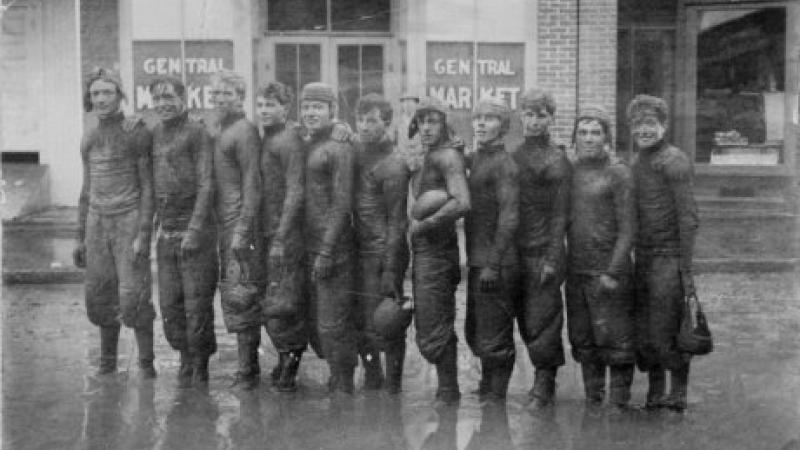50 States of Preservation: Idaho State University in Pocatello, ID

World War I veterans in class in the first forge shop, Idaho Technical Institute (now, Idaho State University), 1920.
Courtesy of Special Collections and Archives, Eli M. Oboler Library, Idaho State University.

World War I veterans in class in the first forge shop, Idaho Technical Institute (now, Idaho State University), 1920.
Courtesy of Special Collections and Archives, Eli M. Oboler Library, Idaho State University.
This feature is part of a series we call “50 States of Preservation,” in which we are touring small and mid-sized museums, libraries, historical societies, and other repositories across the country to show how they are helping to preserve the nation’s cultural heritage. Read other entries in the series here.
Located in Pocatello, Idaho State University (ISU) serves a student body of approximately 13,000. The Eli M. Oboler Library houses the university’s special collections and archives, an important resource for faculty, students, and the general public. The library’s Special Collections includes a unique set of materials dating from the mid-19th century to the present--a treasure trove for researchers interested in Idaho and the American West. Books and manuscripts document, for example, the history of the Bannock, Shoshone, and Lemhi tribes; Western settlement via the Oregon Trail and the Mormon migration; the expansion of the railroads and the emergence of the mining industry; as well as Japanese internment and German POW camps during World War II. Special Collections oversees approximately 2,300 maps and architectural drawings and more than 70,000 photographic prints and negatives. Scrapbooks, ephemera, correspondence, personal papers, business records, oral histories, sound recordings, microfilm, newspapers, drawings, and yearbooks round out its archival holdings. The library also contains numerous books and periodicals, of which 3,800 are considered rare books, some dating to the 16th century. Highlights of the diverse collection include works on the history of Idaho and the Intermountain West, dictionaries created by Dr. Samuel Johnson and his contemporaries, and a collection of contemporary artist’s books. Also heavily used are the papers of Idaho’s first governor George Shoup and Senators Fred DuBois, Thomas F. McAteer, and Richard Stallings. ISU faculty access these materials for teaching, and students make use of them for class projects. Local residents, genealogists, historians and other scholars from around the country consult the university’s rich and diverse collections as well.
For the past four years, ISU’s Special Collections has been managed by a single full-time archivist, with additional support provided by several part-time employees, student interns, and volunteers. Though small, the staff is committed to ensuring both the preservation and wide use of the collection. With a critical need to accommodate its expanding holdings and with the possibility of acquiring additional storage space, the university recently embarked on a systematic effort to plan for the future. Supported by an NEH Preservation Assistance Grant, ISU called last year on Randy Silverman, Preservation Librarian at the University of Utah’s Marriott Library, to provide a comprehensive assessment of the university’s Special Collections. His written report included a number of recommendations: (a) remedial improvements to be carried out immediately, including preservation measures focused on books and photographs; (b) providing for future collection growth by increasing storage space, as well improving environmental conditions and establishing reliable systems for ensuring fire protection and disaster preparedness; and (c) integrating preservation needs into the library’s strategic planning efforts, leading ultimately to a comprehensive regimen for preventive care of ISU’s Special Collections.
Ellen M. Ryan, Head of Special Collections and Archives, commented on the project’s impact: “As a direct result of Mr. Silverman's report, our Library Administration provided us with funds to begin addressing the preservation issues and concerns he raised,” as well as offering ongoing financial support, which, she noted, “is a first for Special Collections at Idaho State University.” Ms. Ryan concluded: “This commitment adds weight to the importance of the NEH and the understanding of the importance of the preservation of our collections and of the humanities to our students, faculty, and researchers. The NEH is vital in assisting with the preservation of our history, be it on the local, state, or national level.”
In every state, NEH supports organizations that preserve humanities collections. Preservation Assistance Grants for Smaller Institutions (PAGs) fund projects that help safeguard photographs, letters, documents, prints, moving images, sound recordings, maps, drawings, artworks, textiles, furniture, and artifacts, making them available for future generations. These collections help researchers, educators, and members of the public better understand the complex stories of the various cities, towns, and tribal groups that make up our nation.
Since 2000, NEH has made nearly 2,000 Preservation Assistance Grants to small and mid-sized organizations to preserve and care for their humanities collections. In all 50 states, the District of Columbia, and Puerto Rico and the Virgin Islands, PAG awards have funded preservation assessments, purchase of shelving, environmental monitoring equipment, and preservation supplies, and training for staff. Organizations in all states and U.S. territories are eligible to apply, and the program encourages applications from those new to NEH. The next application deadline Preservation Assistance Grants for Smaller Institutions is May 1, 2018. If you have any questions about this grant program, please contact us at @email or 202-606-8570.







